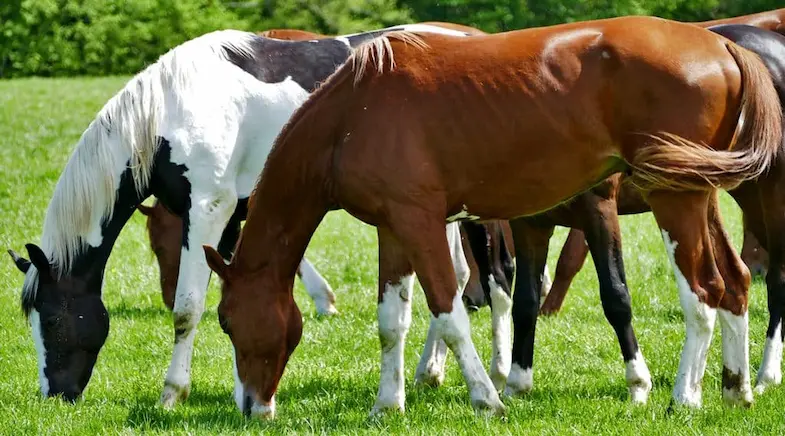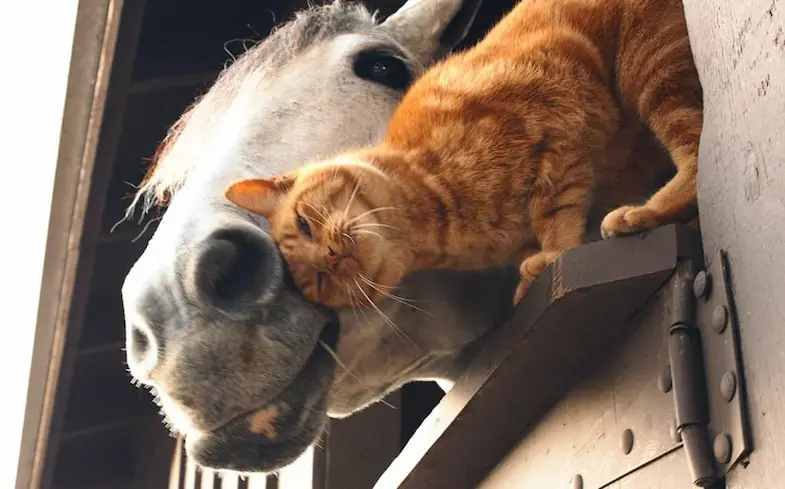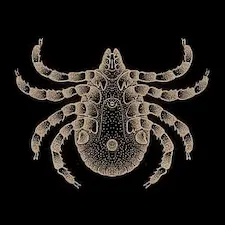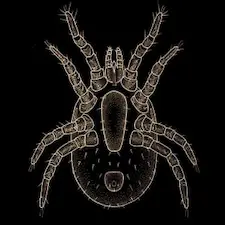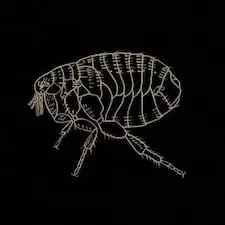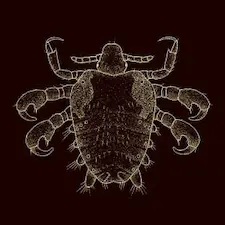There will always be an exception to every rule and while it’s not impossible for horses to have fleas it’s extremely rare for a healthy horse to ever have a problem with fleas. When I talk about a horse having a problem with fleas I mean a horse that is outwardly displaying signs of having them. Signs such as skin that has become raw due to being itched so much in an attempt to ease flea bites. Some horses will pick up one or two fleas in their life, but in cases like these, the fleas are probably just using the horse as a stop-off between hosts rather than as a host itself.
Do horses get fleas? Horse’s generally don’t get fleas because they don’t spend a lot of time lying down. Fleas prefer hosts that live in nests or dens so that they have a warm environment to breed and plenty of ‘victims’.
How do horses get fleas?
While horses won’t suffer from fleas per se they can become a temporary host for any number of reasons. Fleas are opportunistic and can wait for many months, without eating, before finding a new host and if your horse is unlucky he could become that host.
It can be easier than you think for your horse to become a temporary host, for example, you may have recently ridden through a meadow with long grass that a fox or coyote has rolled in. The animal may have long gone but the flea eggs could have hatched and will now be waiting for a new host. They won’t stay on your horse but could (and probably would) travel from him to another four-legged furry host.
Another very common way for horses to pick up fleas is from other animals in the yard such as cats and dogs. Most of us have a cat or two to help keep the local rodent population down or have a canine security guard to deter unwanted visitors. Both of these can easily carry 20 fleas at any one time so it’s understandable that one or two of them may find their way to your horse.
Can horses get fleas from cats?
Fleas are generally host-specific which means that they will live on one species or group of species. This also means that while they can feed on other species they can’t reproduce on that species. Thankfully this makes it very unlikely that a horse will ‘suffer’ from cat fleas (or dog fleas for that matter either). That said though if the yard cat loves nothing more than to curl up on your horse’s back then it’s highly likely some of the fleas from the cat will make their way to your horse.
If this happens don’t worry, as I say fleas are host-specific so they won’t lay eggs on your horse. In most cases, you’ll be able to brush them off of your horse’s coat, either when grooming him or just with your hand. If you’d prefer you can also wash them out of your horse’s coat but if you do this make sure you dry your horse properly after.
How can you prevent a horse from getting fleas?
The best way to prevent your horse from getting any fleas at all is to get rid of the problem at the source by treating the cats and dogs (and all other animals that will come into contact with your horse) for fleas. Removing them from other animals will stop them from being able to travel to your horse in the first place.
If that’s not possible, maybe because you’re regularly traveling to other yards for competition, then don’t worry they can still be easily prevented. Making sure your horse has a well-balanced diet with a natural garlic supplement (you should never feed fresh garlic to a horse) will naturally repel any fleas (as well as flies). Grooming your horse daily will also help to keep him free of fleas.
How do you get rid of horse fleas?
If your horse is healthy then he almost definitely won’t suffer from fleas but if he does manage to pick up fleas from the yard cat don’t worry they’ll likely fall off within a day or two. If, however, you want to get rid of the fleas straightaway then in most cases, a thorough groom followed by some fly repellent will do the trick.
If you’d prefer to use a natural alternative to fly repellent then you could always make your own. Simply boil a pint of water then, once it’s boiled, add a whole lemon (sliced, but with the rind still attached) and leave it to stand for around 10 hours. You can then either use a sponge to rub it into your horse’s coat or if you’d prefer, transfer it to a spray bottle and use it as you would any other fly repellent. The reason that this natural repellent works is because the juice found in the rind of the lemon contains a chemical compound called d-limonene which is known for its insecticide capabilities, in fact, it’s often used in over the counter repellents.
Do horse fleas bite humans?
There’s no such thing as a horse flea so technically, no horse fleas can’t bite humans. If, however, your horse does have fleas then the chances are they’ve come from something like a cat or dog and they can bite humans.
While flea bites can be painful and cause itching the fleas themselves, according to the Centers for Disease Control, aren’t known to carry any disease.
Why don’t horses suffer from fleas?
Most animals with fur suffer from fleas so you might think that horses have developed or evolved a special type of coat that can help to deter the fleas but this isn’t the case. In order to understand why horses don’t suffer from fleas, you need to understand how the lifecycle of a flea works. After biting their host an adult flea will lay around 20 eggs (which they can do daily), as the host animal moves these eggs fall off around where the host lives. The eggs will then stay there for up to two weeks before developing into larvae and later into pupae before returning to their host (or finding another host) to start the cycle again.
If your horse is stabled then surely the eggs can live in the bedding until they hatch? You might think that that would be the case but as of the time of writing this, fleas thankfully haven’t yet evolved to be able to live in straw, wood chipping, or any other type of horse bedding so, therefore, haven’t developed to be able to live permanently on a horse. Also because horses don’t create nests or dens or setts the fleas don’t have a place for their eggs to survive.
What’s the difference between fleas, lice, ticks and mites?
Some people refer to lice, ticks, or mites as fleas and vice versa but they’re actually very different insects. Yes they can all bite and leave the skin feeling sore and itchy and they all feed on blood but that’s where the similarities end.
Ticks (Ixodida)
Like fleas, ticks, which are related to spiders, are host-specific but unlike fleas, there are a couple of species of ticks that are horse specific. Their bites can not only cause the skin to be sore but in some cases can transmit diseases such as Lyme disease (A disease that is transmitted by ticks and is a form of arthritis). In extreme cases, they can cause anemia in horses due to severe blood loss.
Mites (Parasitiformes)
Another relative of the spider, mites can infect horses and will burrow into their host. This burrowing can cause extreme itching and result in a skin condition known as mange. There are many different forms of mange depending on where the problem is on your horse, for example, ear mange and leg mange. The mange can be extremely painful and, if affecting the horse’s leg, can even cause lameness.
Fleas (Siphonaptera)
Fleas are wingless insects that need to eat blood in order to produce their eggs. Despite not having wings they can travel to their host by jumping, in fact, they have such an incredible jump that if they were the size of an average man (say around 6ft) they could easily jump over 670ft!
Lice (Phthiraptera)
As with fleas lice are host-specific and can infect horses. These parasitic insects will live in the horse’s coat and can easily be transferred from horse to horse. If one horse has lice then he needs to be kept away from other horses and all of his brushes, rugs, halters, etc mustn’t be used on any other horse. The good news about lice though is that although they can be very uncomfortable for the infected horse (making his skin sore) they’re not known to transmit any disease.
Further reading
- What’s the best horse bedding?
- Things you should NEVER feed horses
- Where should I keep my horse?
- Feeding a hard keeper on a budget
- Is my horse healthy?
- Feeding a horse without pasture
I hope you found this article helpful. If you did I’d be grateful if you could share it please as it would really help me.
Recommended products
Over the years I have tried hundreds of different horsey products, from various blankets and halters to different treats. Some I’ve loved, others I’ve hated but I thought I’d share with you my top all-time favorite products, the ones I never leave the yard without. I’ve included links to the products (which are in no particular order) that I really think are great.
- Horse Knots by Reference Ready – If you’re like me and enjoy pocket reference guides then you’ll love this knot tying guide. These handy cards can easily fit in your pocket or attach to the saddle for quick reference. They’re waterproof, durable and are color coded to make them easy to follow.
- Mane ’n Tail Detangler – Even if you never show your horse you’ll need to detangle his tail from time to time (and possibly his mane too) which is always a challenging chore! I’ve found that if I run a little bit of detangler through my horse’s tails every few days it stops them from getting matted up and makes combing them easy, even if they’re coated in mud. I don’t know if I should admit to this or not but it also works wonders on my hair.
- TAKEKIT Pro clippers – Over the years I’ve tried a lot of different clippers and while some were obviously better than others I found these to be by far the best. They are heavier than a lot of other clippers but for me, that’s a good thing, it makes them feel more sturdy and hardwearing. On top of that they have a range of speeds so are just as good for clipping your horse’s back as they are his face. I also like the fact that they come in a handy carry case but that’s not for everybody. The company that makes them is super good and incredibly helpful too, a real bonus these days. The only thing I wasn’t keen on was the fact that it doesn’t come with any oil, but that’s not a major problem as it’s not difficult to buy lubricant.
- Shire’s ball feeder – There are so many boredom buster toys out there but I like to use these every day, regardless of whether or not my horses are bored. I find that it helps to encourage my horses to problem solve by rewarding them with treats (or pieces of fruit) but it also mimics their natural grazing behavior which helps to keep them calm and de-stressed.
- Horse safe mirror – This is a strange one that many people are surprised about but I like to put horse safe mirrors in the trailers as well as in the quarantine stalls. It helps to prevent the feeling of isolation by giving the impression of other horses being around. Being herd animals horses can get extremely stressed when they feel that they’re on their own but with these stick-on mirrors, they believe that at least one other horse is with them.
- Rectal thermometer – I know this isn’t glamourous at all but it’s vital for your horse’s well-being to be able to check their temperature and a rectal thermometer is the easiest way of doing this which is why I’ve added it to the list.
Shopping lists
I’ve also put together a few shopping lists of essential items that I’ve found helpful over the years. I’ve broken the lists down into different categories rather than put everything in one massive list 😉

